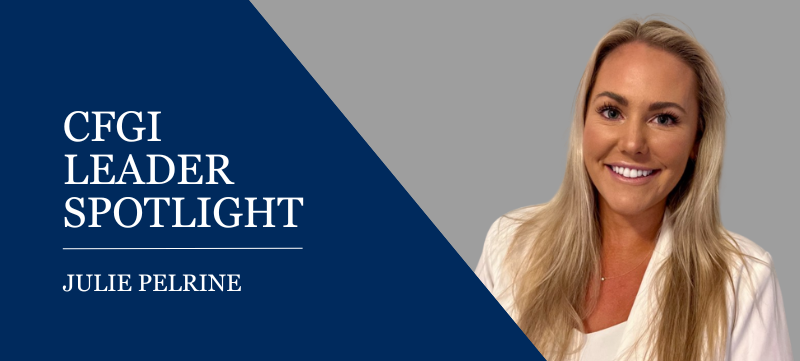
In pursuit of satisfying and meaningful experiences in the financial advisory space, Julie Pelrine sought deeper engagement with the funding of life sciences companies. This proved to be the right decision, as it triggered a rapid ascent through the ranks, which has led her to the leadership of a team in CFGI’s Washington, D.C., office.
Big 4 experience and branching out
After graduating cum laude with a Bachelor of Business Administration in Accounting degree from the University of Massachusetts Isenberg School of Management, Julie joined KPMG. In her time at the firm, she worked on large audit projects. While the work was in-depth and prepared her for her career, she wanted to find an organization that would offer a path to more meaningful work. After almost four years with KPMG, Julie joined CFGI as a consultant.
After coming from the consumer goods auditing space, Julie was drawn to work with biotechnology and other life sciences companies in her CFGI career. Working with these smaller, often pre-revenue companies was the fascinating challenge she craved. Helping these companies realize their bold ambitions in health care made Julie feel like she was using her financial skills to give back to the world.
A historically fast ascent
Ensconced at CFGI and doing work she loved, Julie rose through the ranks at astonishing speed. After a year and a half as a consultant, two as a manager, one year as a senior manager and two as a managing director, she became partner. She holds the distinction of being the youngest and the fastest-promoted partner in the firm’s history.
At the head of her own team, Julie takes on a wide variety of financial duties for both pre- and post-IPO life sciences companies. These businesses are often very small in size and eager to pour as much money as possible into research and development, meaning they need responsible and resourceful stewards to help them through their fiscal duties.
The typical timeline for Julie’s work with these businesses comes pre-IPO when they’re deciding whether to keep raising funds, go public or merge with a special-purpose acquisition company. These light, agile companies often have just a chief financial officer and maybe a controller on staff, so Julie’s people take on all the accounting and financial statement work.
When it’s time to prepare for the IPO, the CFGI team creates a framework to keep lawyers, bankers, auditors and more on task and organized. Then it’s time for the actual public offering and often a reverse stock split then into SEC reporting requirements. Julie works closely with the CFO during this complex period, especially if that official has never led an IPO.
Julie prides her team members on their ability to think like auditors and give salient advice through the IPO by acting as an extension of their clients team. They come by this information naturally, as many of them came from the world of audits. There are also natural opportunities to match clients with other CFGI services such as risk advisory and tax advisory.
Expansions into new areas
Julie helped build the CFGI life sciences team in Boston into an industry-leading powerhouse. After helping to establish the west coast team, Julie moved to the Washington, D.C., area to further her personal life and took charge of the CFGI team there. Finding a large potential audience of biotechs and other startups in need of her help, she’s begun to dig in and deliver results.
“I get to manage all of these people, my life sciences team as well as my team here in D.C. that have all these different skill sets,” Julie says. “Showing them how to go to market and talk to prospects has been rewarding. Who knows what’s in store next, but there’s a lot of untapped life sciences companies here that surely do need help from an accounting perspective.”
Developing the team has become just as central to Julie as her personal progress. She refutes the old assertion that the best approach is for a single person to take the whole load on. She has thrown herself into team-building, intelligent delegation and coaching and mentoring for her people.
Between these internal development efforts and the work she puts in for idealistic life-sciences before, during and after their IPOs, Julie has ended up in a position to satisfy her ambitions and put her prodigious talents to work. She doesn’t know for sure which direction her career will take her over the long term, but with so many opportunities, she knows she’ll never be bored.
